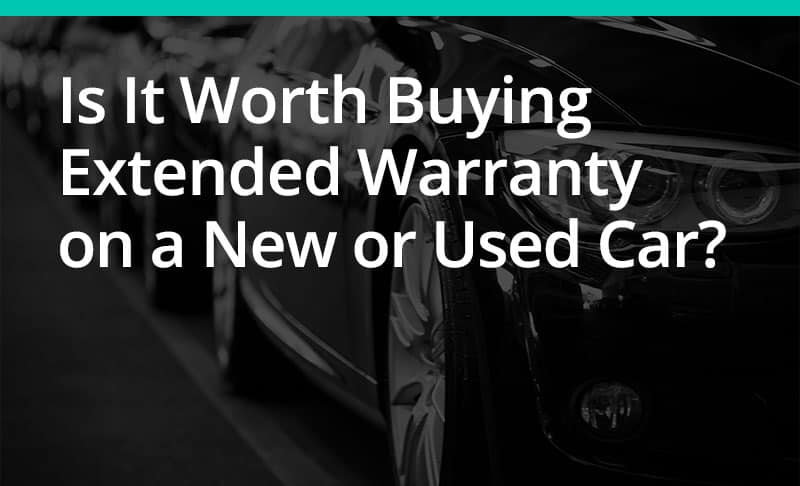
Is It Worth Buying Extended Warranty on a New or Used Car?
There are a lot of decisions that come with purchasing a vehicle. Are you interested in a new or used car? Do you want an automatic or a standard transmission? What colour feels more you, cherry red or cobalt blue?
Even after you’ve found a vehicle that checks all the boxes on your must-have list, you’ll need to decide if you want to add an extended warranty to the purchase. While it may seem like an easy decision, there are a few things you should know before you make the investment or choose to forego the extra coverage.
- What is extended warranty on a car?
- What’s included in an extended car warranty?
- How much does extended car warranty cost?
- Different kinds of extended car warranty.
- Should you get an extended car warranty?
What is extended warranty on a car?
An extended warranty or service contract is essentially an insurance policy for your vehicle. Different warranty options cover different things, but they all protect against surprise vehicle repairs for a specific time period.
All new cars, trucks and SUVs come with a factory warranty that covers your vehicle for the first few years of ownership or the first 36,000 kilometers of driving, whichever comes first. During the factory warranty period your vehicle’s manufacturer will foot the bill for labour and repairs of anything covered in the contract. Purchasing an extended warranty makes this kind of coverage last longer.
What’s included in an extended car warranty?
What’s included in an extended warranty depends on your preferences and your budget. Some plans only cover mechanical breakdowns, but don’t include issues caused by regular wear and tear. Here are the most common kinds of extended warranties:
Powertrain
Basic coverage plans will come with a powertrain warranty that covers all of the integral and expensive parts of your vehicle: your engine, driveshaft and transmission. These warranties usually last longer (6 to 10 years) because these systems are the least likely to break down.
Bumper-to-bumper
A new vehicle will come with a comprehensive or factory warranty that covers almost everything between its front and back bumper for the first 3 to 5 years of its life. Extended warranties can lengthen the bumper-to-bumper coverage for 2 years or more. Tires, brake pads, modified stereo systems, seatbelts and headlights are usually excluded from comprehensive plans.
Wrap
If your powertrain warranty is still in effect but your bumper-to-bumper coverage has run out, you can purchase a wrap policy that covers every other part of your vehicle.
Some extended warranty providers will also try to sweeten the deal with add-ons like roadside assistance or rental car coverage. However, these perks often come with an added cost.
How much does extended car warranty cost?
The cost of an extended warranty policy depends on a number of factors, like the length of your coverage period, the kind of coverage you get and the condition or make of your vehicle. Most plans start at around $2,000, but more coverage is usually more expensive.
Some extended warranties come with deductibles that can lower the overall cost of the agreement. For example, if you repair bill is $750 and your deductible is $200, you’ll pay the amount of the deductible and the warranty provider will cover the remaining $550. You’ll be able to choose the amount of your deductible when negotiating your contract, but you should keep in mind that a lower deductible will mean a more expensive warranty.
You should also find out how the warranty provider pays for repairs and if the work needs to be pre-approved before you take your vehicle in. Ask if they will sort out the bill directly with the mechanic or if you’ll have to pay upfront to be reimbursed later.
Hot tip: Don’t add your extended warranty payment to your car loan. You will end up paying more for the coverage because of the added interest!
Different kinds of extended car warranties
There are two kinds of extended warranties on the market: those backed by the manufacturer and those offered by third-party companies.
Major car makers like Ford, Honda and Nissan will offer extra coverage for their vehicles once the factory warranty has lapsed. These are only available for new vehicles purchased at an affiliated dealerships and the parts used in repairs will always be brand-specific or original equipment manufacturer (OEM) certified.
Third-party warranties are usually cheaper than those provided by a manufacturer and can be applied to both new and used vehicles. However, you should do your research to make sure the company is legitimate before you sign the dotted line. Look them up online and find out how long they’ve been around and what other customers are saying about them. You don’t want to be stuck with a useless contract because the company closed abruptly.
Should you get an extended car warranty?
While it all comes down to personal preference, extended car warranty is also about the length of time you plan on driving your vehicle for. For car owners looking to drive the same vehicle for 10+ years, you might want to consider extended warranty after your new car warranty expires.
To help you make an informed decision, we’ve put together a list of the pros and cons:
Pros of an extended car warranty
- It covers costly repairs: Owning a vehicle is an expensive responsibility and there are a lot of things that can go wrong. Most people don’t have the thousands of dollars it costs to fix a blown transmission or a seized engine just lying around. Having an extended warranty means you’ll be able to afford major repairs whenever they arise.
- You can customize the contract: You don’t have to choose all or nothing. Most warranty providers have different coverage tiers that allow you to customize the contract to fit your needs. Have money set aside for general upkeep, but don’t want to worry about paying for an expensive repair like a broken axle? A powertrain warranty may be all you need.
- It gives you peace of mind: This is a big one if you have a tendency to worry about what ifs. An extended warranty will give you peace of mind that regardless of what happens down the road, you’ll be able to fix your vehicle without a hassle. Something that’s particularly important if you plan on driving it for a long time.
Cons of an extended car warranty
- You may never use it: Buying extended warranty is a financial gamble because you never know if you’ll actually use it. While you’ll be happy you have it if an expensive breakdown happens, you might end up paying thousands of dollars for coverage you never need.
- Not all repairs are covered: Even top-tier warranties don’t cover absolutely everything. This means you’ll still be paying for things like oil changes and tune ups on top of your extended warranty coverage. With some warranties, the contract will be voided if you fail to keep up with a routine maintenance schedule.
- You might have limited mechanic options: Manufacturers often require you to bring your vehicle to a shop that they own or have partnered with. This can be a major inconvenience if your vehicle breaks down in a different part of the country or if you move to a new area without an affiliated garage.
It’s important to take your time and get all the information before deciding whether or not to buy an extended warranty. While unexpected mechanical problems are a big financial burden, so is a pricey warranty contract that never gets used. If you’re stressed about the decision you should ask the dealership or warranty provider if you can sign up for an extended warranty later.
At Birchwood Credit Solutions, we make auto financing easy. Our entire process is designed to be hassle-free and quick, ensuring you spend no more than two minutes filling out our application form. Within no time, we’ll have you driving a vehicle that fits both your lifestyle and budget.
Related blog posts:



